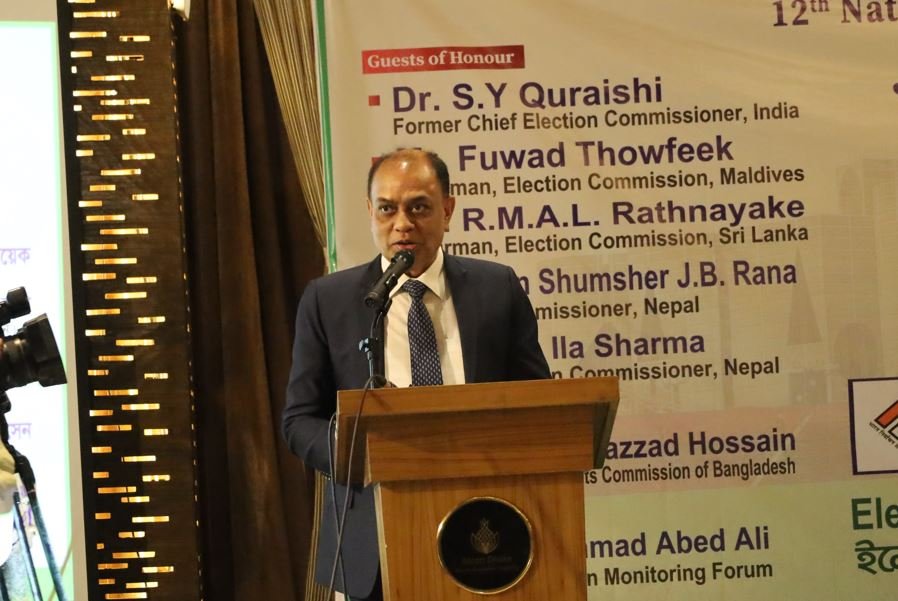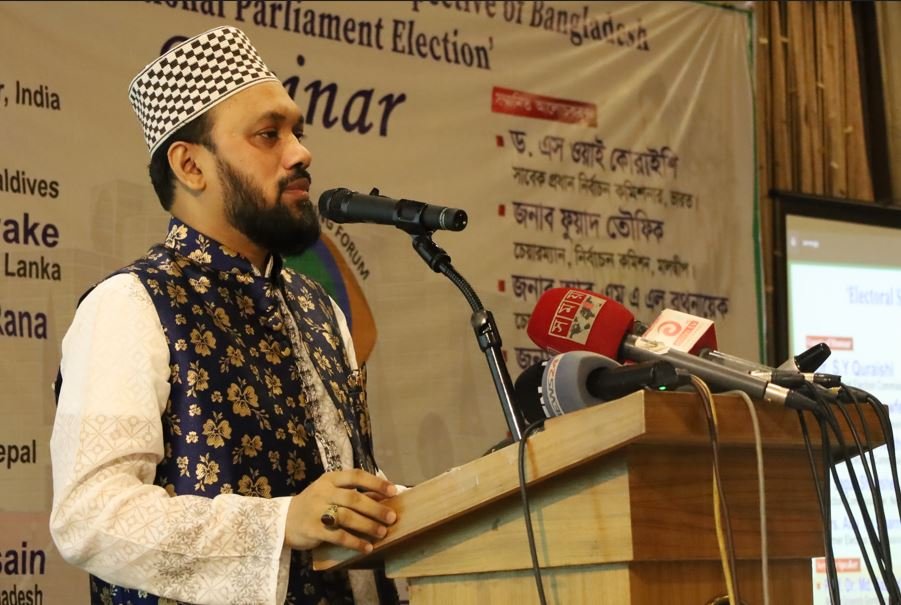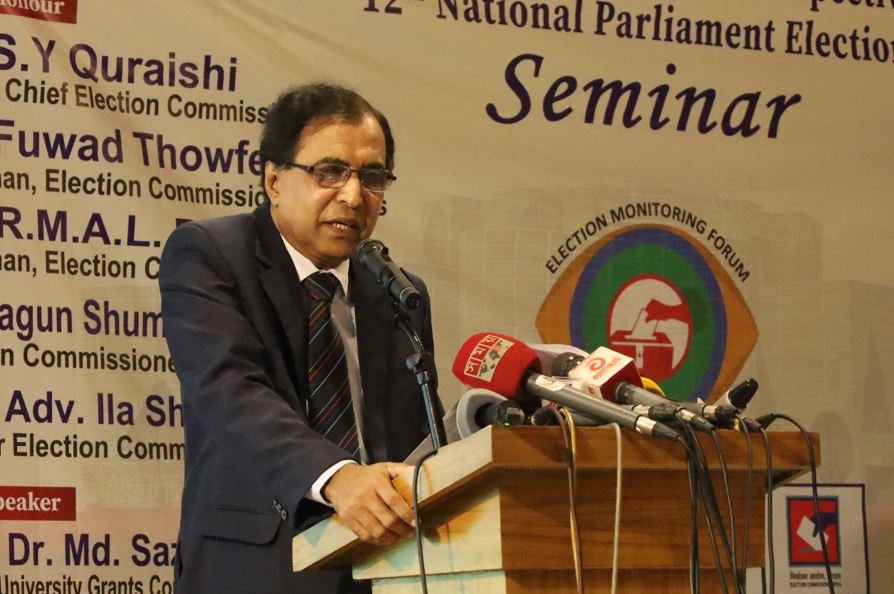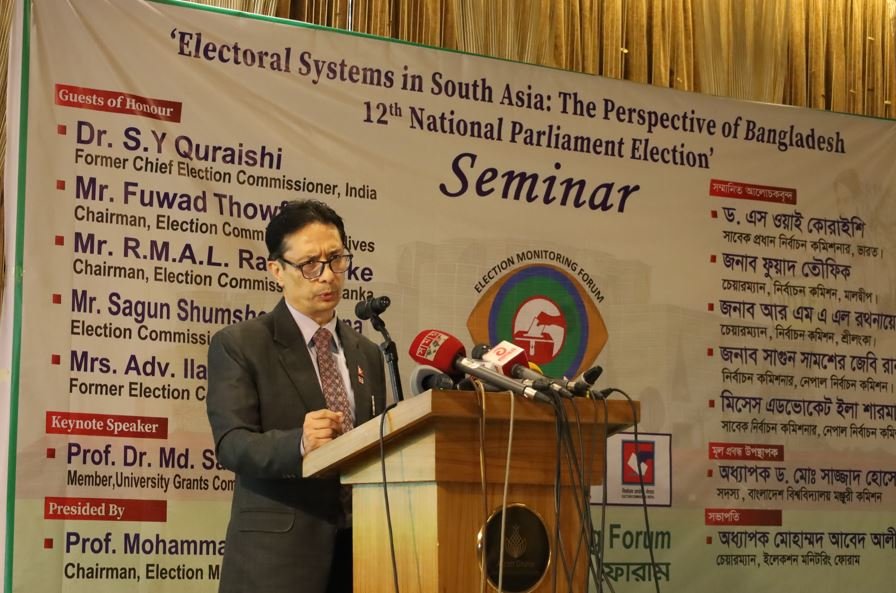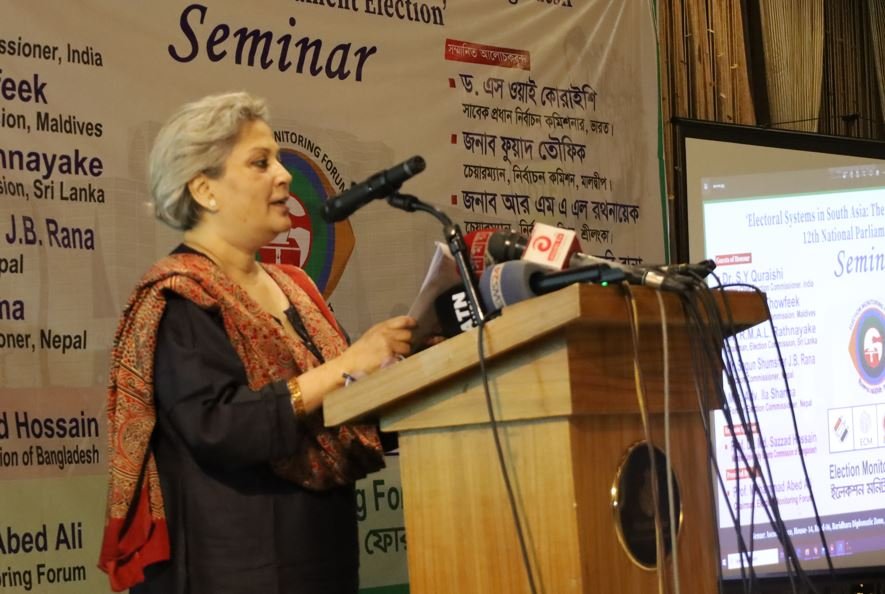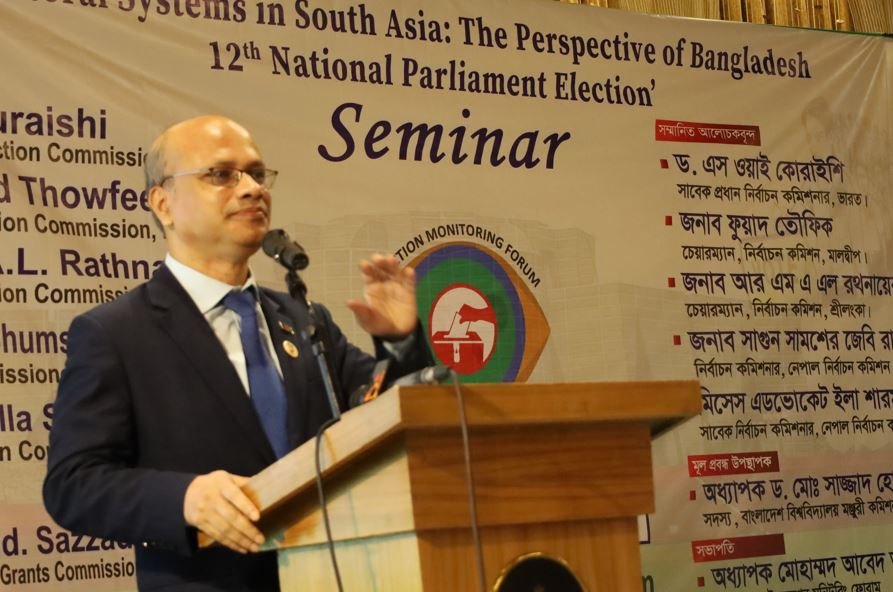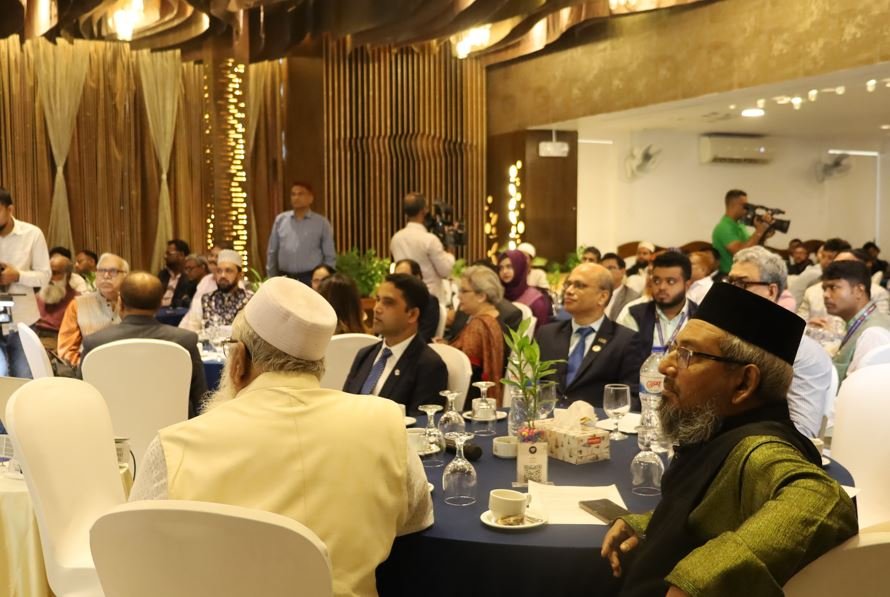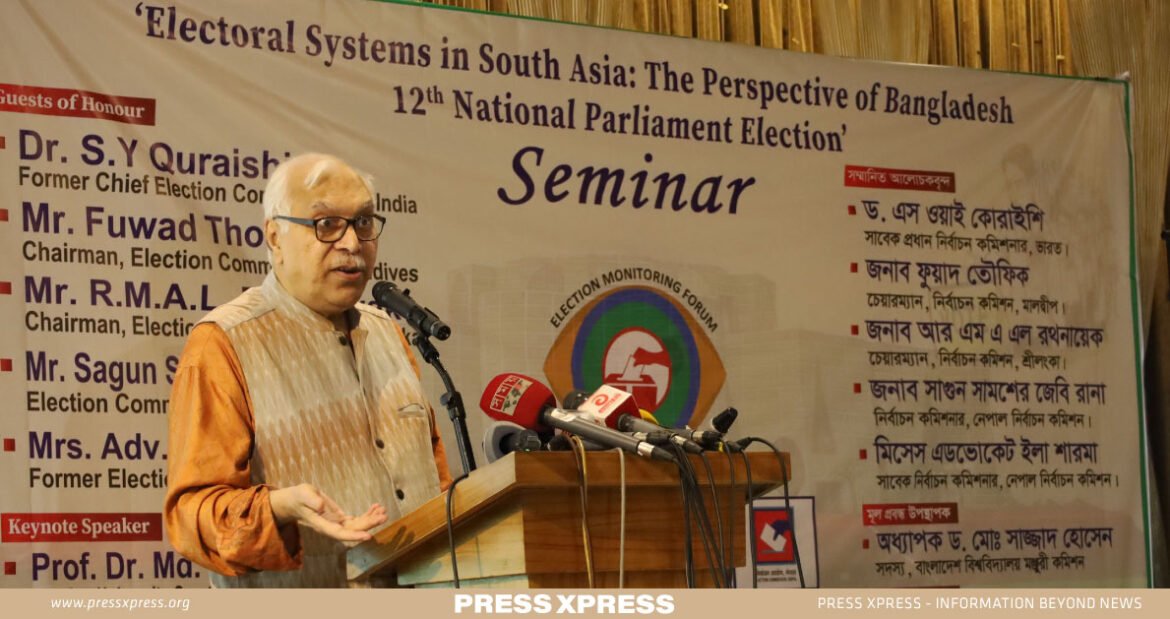The negotiators at the seminar emphasized that there is no substitute for political dialogue and compromise when it comes to orchestrating peaceful elections
A seminar titled “Electoral Systems in South Asia: The Perspective of Bangladesh 12th National Parliament Election” was held on October 28, Saturday morning at a local hotel in Dhaka to discuss the democratic election process of South Asian countries including the prospect of Bangladesh. The event was organized by the Election Monitoring Forum.
The event was organized under the chairmanship of Forum Chairman Professor Mohammad Abed Ali and moderated by Prof. Dr. Abdul Jabbar Khan.
Dr. S.Y Quraishi, Former Chief Election Commissioner, India; Mr. Fuwad Thowfeek, Chairman, Election Commission, Maldives; Mr. R.M.A.L Rathnayake, Chairman, Election Commission, Sri-Lanka; Mr. Sagun Shumsher J.B. Rana, Election Commissioner, Nepal; Mrs. Advocate Ila Sharma, Former Election Commissioner, Nepal were the guests of honor at the event.
Honorable High Commissioner of Maldives Mrs. Shirujimath Sameer; Sri Lankan Acting High Commissioner Mrs. Ruanthi Dipatia, Ambassador of the Philippines Liu Titu L. Osan JR, Representative of the Russian Embassy in Dhaka Mr. Oleg Kozin Attaché also embraced the conference.
Professor Dr. Sazzad Hossain, an esteemed member of the University Grants Commission was the keynote speaker of the event. In a speech, he highlighted the distinctions between South Asian and Western elections, emphasizing the importance of elections in democracy. He outlined four challenges for Bangladesh, including preventing external interference and ensuring fair, constitutional elections, engaging opposition parties, and fostering friendly international relations.

Key highlights from the guests of honors and key note speakers
Former Chief Election Commissioner of India, Dr. S.Y Quraishi, emphasized that India’s voting system is focused on the citizens. He clarified that India never requested a caretaker government, as the Election Commission essentially assumes that role during the election process. Even proposing measures beneficial for citizens before the cabinet requires the Election Commission’s approval. He also stressed the importance of a high voter turnout and suggested emulating the voter education initiatives undertaken in Bihar, which led to the highest voter turnout.
Former Election Commissioner of Nepal, Mrs. Advocate Ila Sharma, emphasized the critical role of media freedom during elections. She stressed the need for accurate information provision to prevent the dissemination of speculative and fake news. Additionally, she advocated for an increased participation of women in parliament, aiming for a target of 50%, while the current representation stands at 41%.She further mentioned that a caretaker government is not a common practice but Nepal had a caretaker government only once under special situation.
Election Commissioner of Nepal, Mr. Sagun Shumsher J.B. Rana, highlighted how election process in his country has evolved and how teenagers in Nepal are interested to vote. He also underscored the utilization of social media platforms to engage voters.
Mr. R.M.A.L Rathnayake, Chairman-Election Commission, Sri-Lanka, emphasized that Sri-Lanka and Bangladesh are similar in terms electoral system and also shared the brief history of Sri Lanka’s election process.
Chairman of the Election Commission of Maldives, Mr. Fuwad Thowfeek, explained the challenges of conducting elections in Maldives. He highlighted the implementation of a rule to place ballot boxes and polling stations on the closest islands, aiming to streamline the process and reduce costs.
Moderator Prof. Dr. Abdul Jabbar Khan, Pro VC-BUET and Director of the Election Monitoring Forum, addressed queries about the UN’s role in administering elections. He clarified that the UN seldom oversees a nation’s election and the likelihood of it happening in this context is minimal. He emphasized that the Government of Bangladesh would need to make a formal request for such assistance. Heemphasized on SDG, MDG goals, Vision 2041, energy sector resilience transportation development and why people are trying to violate Vienna Convention.
The negotiators at the seminar emphasized that there is no substitute for political dialogue and compromise when it comes to orchestrating peaceful elections. Gaining the backing of the general public cannot be achieved through the instigation of conflict, chaos, terror, and public suffering. The sole method for bringing about a change in government is by recognizing the significance of elections and voting rights. It would contradict democratic principles to alter the government through any other means aside from elections. The citizens of independent Bangladesh will ultimately determine their voting choices, the nature of their votes, and the individuals who will govern the nation.
In the seminar, former Appellate Division judge of the Bangladesh Supreme Court, Siddiqur Rahman Mia, engaged in a discussion representing civil society, and he was joined by Justice Nizamul Haque Chowdhury, the Chairman of Bangladesh Press Council, Supreme Court High Court Division, Justice Sheikh Hasan Arif, former Foreign Secretary and Ambassador Mr. Waliur Rahman, Vice-Chancellor Professor Dr. Habibur Rahman, Vice-Chancellor of Bangladesh Agricultural University Emdadul Haque Chowdhury, Professor Dr. Bangabandhu Digital University Vice-Chancellor Mahfuzul Islam, Vice-Chancellor of East West University Mohammad Farasuddin, Dhaka University Vice Chancellor Professor Dr. ASM Maksud Kamal, former Election Commissioner Shah Newaz, Brigadier General Mr. Shahadat Hossain Chowdhury, Chairman of Bangladesh Satellite Company Ltd. Professor Shahjahan Mahmud, Md Emran Jahan of Jahangirnagar University, Deputy Attorney General Advocate Abul Hashem, Actor Ferdous Ahmed, Mubaraki Group Chairman Syed Anwar Mubaraki, Prof. Dr. Abdul Jabbar Khan, Pro VC-BUET and Director-Election Monitoring Forum, and Vice-Chancellor of Islamic Arabic University Abul Kalam Azad.
The event ended with a luncheon followed by the speeches.
